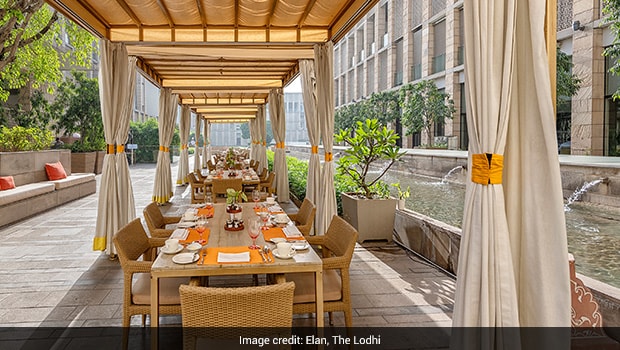Awadhi cuisine is the crown jewel of North Indian food. Influenced by Mughlai, Kashmiri, and even Hyderabadi food, Awadhi food is a rare combination that very few restaurants can ace. This cuisine has the 'thehraav' that gives any art form its depth and popularity. The Awadhi style of cooking which is popular for the 'Dum' technique and the 'Gile Hikamat' technique of slow cooking, has now spread across the country with people contextualizing these techniques to their taste and locally available raw material. The Awadhi cuisine, though somewhat inspired by Mughalai cooking, is actually very different in its cooking techniques and its unique focus on layering of different flavours by slow cooking.
We were recently invited to the Awadhi Food Festival called Dastakarwan-e-Awadh hosted at restaurant Elan, at The Lodhi Hotel New Delhi. Because a lot of restaurants today claim to offer authentic Awadhi cuisine, we did not truly expect to be completely blown away by the food. But morsel after morsel, we were reminded of the legacy of true Awadhi cuisine and why there is merit in restoring some of these century-old recipes. The menu is curated by chef Nurul Bashar from the original recipes of the Khansamahs of the Nawabs of Lucknow. And we were almost tempted to spend the entire evening just talking to him about the uniqueness and simplicity of the Awadhi cuisine.
We started the tasting melt-in-the-mouth Barra Kebab which was a mildly spiced mutton kebab almost like a galaoti kebab but with a surprise filling inside that almost provides a unique baseline to the spices in the kebab. This was followed by Tali Kasundi Macchi and Murgh Shami Kebab. Tali Kasundi Macchi was a generous fillet of pomfret marinated with rich Bengali kasundi and pan-fried to crispier than a papad. The Murgh Shami kebab was also a welcome change on the palate.

Barra Kebab

Raan-e-Awadh

Anjeeri Paneer Tikka
After the starters, we were inundated with pots of vegetarian and non-vegetarian dishes. When a true non-vegetarian has a plethora of options in front of them ranging from Nalli Nahari Gosht to delicious Kormas and you find yourself going back for more and more vegetarian dishes - you know the chef has been able to work his magic on the very humble Indian paneer and dal, which is the epicentre of restaurant dining for 95% of Indian vegetarians. Our strong recommendation is for you to try the Paneer Bemisal and the Subz Kehkashan. These dishes while might sound ordinary and a part of almost all menus, but the chef has been able to do something really magical with them. The Nalli Nahari and the Murgh Nakhlavi Korma is also must-try for the non-vegetarians. The bread we liked the most and went well with our dishes was Naan-e-Bakhumach. It's soft from the inside but crispy on the outside and slightly reminds you of the very popular khameeri roti which is usually eaten with Kormas. After having tasted all of this, we still had two voluptuous pots of dum biryani staring at us. We opened the deghs and the aroma of the mild spices and very well cooked mutton and Gucchi mushrooms filled the air around us and reminded us of the luxury that Awadhi food is known for. The chef's special recommendation was the Dum Doodhiya Biryani which is a mildly spiced creamy biryani and the Gucchi Pulao, which transcended our expectations from mushrooms.

Nalli Nihari Gosht
To end this opulent Awadhi treat the chef brought to us Shahi Tukda Asal and his special Kulfi Falooda, both of which were a pleasant treat to our taste buds.
We want to give a special shout-out to the staff there - Lokesh Chandra Wariyal - who just made us feel so at home that we literally sat there for more than three hours.
Date: 8th - 25th February 2021
Time: Lunch and Dinner (12 noon to midnight)
Venue: ELAN at The Lodhi, New Delhi
Average Meal for Two: INR 4500 plus taxes









